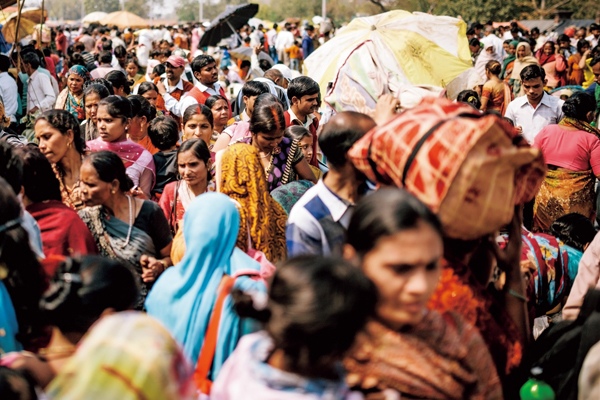
More than a quarter-century has passed since the concept of Human Security was first introduced. Over the period, the world has experienced rapid globalization, technological innovation, and socioeconomic development, but the threats in the world have also become increasingly complex and intertwined. Against these changes, JICA continues to be committed and strengthen its efforts to realize Human Security as part of its core mission.
What is Human Security?
It is the concept that, "All individuals are entitled to freedom from fear, freedom from want, and the freedom to live in dignity, and the global community and each country must prioritize building a world that secures these essential freedoms."
Fear, Want, and Human Dignity
Achieving Human Security means that people are free from the fear of conflict and terrorism, crime, natural disasters, infectious diseases, and so on, as well as free from the wants such as poverty, lack of nutrition, or poor education or health.
As natural disasters worsen poverty and poverty raises the risk of violent conflicts, "freedom from fear" and "freedom from want" are linked to each other and require holistic responses.
Furthermore, Human Security aims to create a society where people not only survive, but can develop the capabilities of individuals and communities, and realize their freedom and potential; in other words, a society that ensures the right to live in dignity.
Identifying and Responding to Diverse Threats
Protecting Rights to Life, Live lihood, and Human Dignity
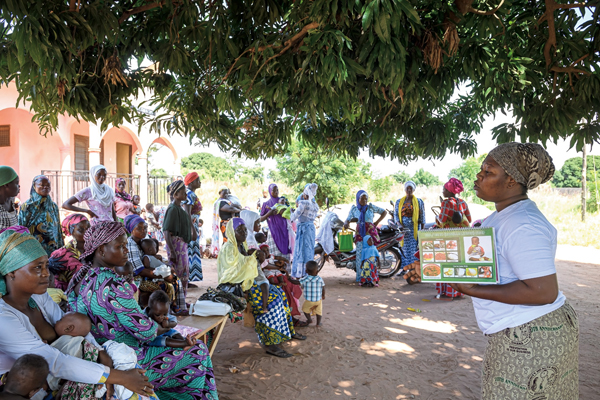
The range of threats that identify fear and want
"Human Security" is a concept that gained attention in 1994, when the United Nations Development Programme (UNDP) introduced it in its Human Development Report (HDR). In 2003, the Commission on Human Security collated their work into a report titled "Human Security Now." One of the co-chairs at the time was Mme. OGATA Sadako, who became JICA president soon after. Since then, JICA has carried out its programs with the aim of making Human Security a reality.
More than 25 years have passed since its first appearance in UNDP's HDR, but the importance of Human Security has only increased. The COVID-19 pandemic directly threatens the lives of millions of people. This crisis is forcing more people into desperate conditions, especially those who have long faced social or economic difficulties. In addition to infectious diseases, there are many other threats to people's "lives, livelihoods, and dignity." These include conflict, terrorism, intolerance against ethnic or religious minorities, poverty, malnutrition, and more. We are also facing the rise of new and increasingly complex threats, such as growing inequality, non-communicable diseases (NCD), the health and social protection challenges posed by ageing societies, the frequent and severe natural disasters accelerated by climate change, the widening digital divide, the impact of the advancement of science and technology on society, and the suppression of freedom and human rights. Recognizing these serious threats to freedom from fear and want, JICA aims to achieve Human Security by building societies where people are free of fear and want and can live with dignity.
Responding to new challenges
JICA is implementing a range of activities in response to the renewed importance and current needs for Human Security in today's context. When the idea of Human Security emerged in the 1990s, conflicts were rampant, and the number of refugees and displaced persons grew rapidly. Consequently, Human Security was generally seen in the contexts linked to conflicts and refugees. However, in a longer-term, preventing the recurrence of conflicts requires fostering a culture of reconciliation and establishing the rule of law. Improvements in poverty reduction, health, and education are also essential if people are to live in dignity. Furthermore, this will require basic infrastructure such as clean water as the foundation of public health, as well as roads and electricity. Today, it is also essential to reduce and prepare for disaster risks to protect people from frequent natural disasters. In addition to these areas unless we address the digital divide through better quality education and capacity building, we will not be able to realize Human Security.
At the same time, this new era also allowed us to find new solutions. Through IT-based innovations and collaborating with a diverse range of partners, we are now able to respond to issues that were hard to solve in the past. For example, the Maternal and Child Health Handbook for refugees and displaced people is now available as a smartphone app, and has become easier for accessing and protecting data. Smartphones and drones are also being used to provide medical services to remote areas. Such new solutions are helping us to accelerate the achievement of Human Security.
Recommendation from Mme. OGATA Sadako, Co-Chair for the Commission on Human Security
Dr.OGATA Sadako, having finished her term as the United Nations High Commissioner for Refugees, was appointed as co-chair of the Commission on Human Security that was formed in 2001 by the proposal of then-prime minister, MORI Yoshiro. She proposed the construction of a concept of Human Security and outlined the measures required from the international community. Additionally, she emphasized the necessity of expanding the focus of security from the nation to the individual. Further, the report defined Human Security as "protecting the vital core of all human lives in ways that enhance human freedoms and human fulfilment."
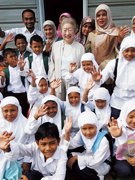
Building Capacity of People and Systems for Prevention
To Achieve Human Security
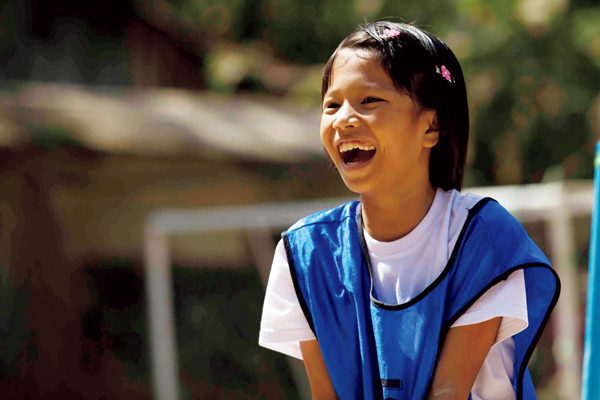
Guiding Principles
In order to protect the "life, livelihood and dignity" of each individual and to achieve Human Security, JICA has set forth two guiding principles. One of them is "empowering individuals, organizations, and societies to increase their capabilities." People in developing countries are, of course, not people in need of permanent assistance. They are not just weak individual to be protected from threats, but have the ability to act on their own behalf and for society. We focus on developing the potential of individuals, their organizations, and their communities so that they can address many problems locally.
The other principle is "building resilient societies (systems) that can protect themselves against various threats." To that end, JICA emphasizes "prevention." To reduce infections from spreading, we encourage preventive initiatives such as washing hands and wearing masks. To prevent conflicts from recurring, JICA supports nurturing a culture of mutual understanding and reconciliation that transcends religious and ethnic differences through sports exchanges. To minimize the impact of natural disasters, it is necessary to build levees, improve the accuracy of forecasts, and conduct evacuation drills. In this way, we can protect people by creating a society that minimizes damage and allows them to recover quickly when a threat strikes.
JICA's approach
These principles are reflected in the various ways of cooperation undertaken by JICA. By looking at various threats to people in the order of their seriousness, we can see clearly the people who face threats to their lives, livelihoods, or human dignity. Such analysis can supplement the data at country-level, and it enables us to see the people in most need. In order to protect people's freedom and dignity, it is imperative that society as a whole and the international community work together to create systems to protect people from threats and to strengthen the capacity and institutions so that people, organizations and societies can help each other.
To live in dignity, a number of conditions are required. They include: better nutrition, education, a hygienic environment, economic stability, social security, and the rule of law. Numerous challenges such as poverty, health, hygiene, and education can overlap each other to deprive people of their freedom and potential. Therefore, to achieve Human Security, we need integrated approaches that can deal with the various factors that deprive people of their freedom and potential. It is an approach that goes beyond just thinking of solutions for each sector separately, and requires partnership with a range of organizations and experts in multiple sectors.
The Global society is working together on achieving the Sustainable Development Goals (SDGs). JICA, while working on the SDGs, is guided by the principles of Human Security and focused on the individuals, making efforts to strengthen the abilities of people to address challenges on their own, and contributing to the creation of systems that can respond to a range of threats, including new ones.
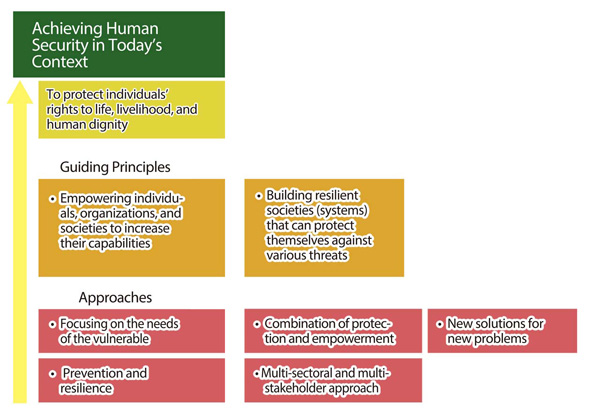
Achieving Human Security in Today's Context
To protect individuals' rights to life, livelihood, and human dignity
Guiding Principles
- 1 . Empowering individuals, organizations, and societies to increase their capabilities
- 2 . Building resilient societies (systems) that can protect themselves against various threats
Approaches
- 1 . Focusing on the needs of the vulnerable
- 2 . Prevention and resilience
- 3 . Combination of protection and empowerment
- 4 . Multi-sectoral and multi-stakeholder approach
- 5 . New solutions for new problems
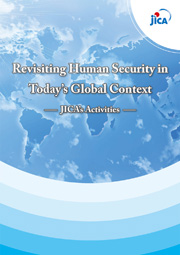

Scan the code for details




scroll